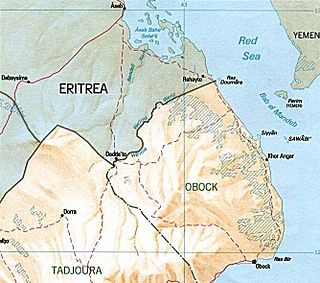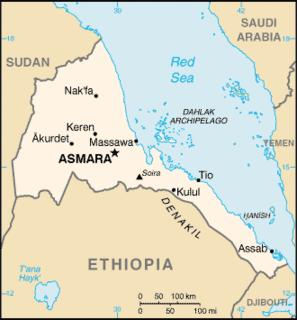| |||||
| Decades: | |||||
|---|---|---|---|---|---|
| See also: | Other events of 1999 Timeline of Eritrean history | ||||
Events in the year 1999 in Eritrea .
| |||||
| Decades: | |||||
|---|---|---|---|---|---|
| See also: | Other events of 1999 Timeline of Eritrean history | ||||
Events in the year 1999 in Eritrea .

The Eritrean–Ethiopian War, also known as the Badme War, was a major armed conflict between Ethiopia and Eritrea that took place from May 1998 to June 2000. The war has its origins in a territorial dispute between the two states. After Eritrea gained independence from Ethiopia, relations were initially friendly. However, disagreements about where the newly created international border should be caused relations to deteriorate significantly, eventually leading to full scale war. According to a 2005 ruling by an international commission, Eritrea broke international law and triggered the war by invading Ethiopia. By 2000, Ethiopia held all of the disputed territory and had advanced into Eritrea. The war officially came to an end with the signing of the Algiers Agreement in 12 December 2000; however, the ensuing border conflict would continue on for nearly two decades.

Said Djinnit is an Algerian diplomat who has been Special Envoy of the United Nations Secretary-General for the Great Lakes region in Africa since 2014. Previously he served as the Special Representative and Head of the United Nations Office for West Africa (UNOWA).

The Djiboutian–Eritrean border conflict between the forces of Djibouti and Eritrea occurred between June 10 and June 13, 2008. It was triggered by tension which began on April 16, 2008, when Djibouti reported that Eritrean armed forces had penetrated into Djibouti and dug trenches on both sides of the border. The crisis deepened when armed clashes broke out between the two armed forces in the border area on June 10, 2008. During the conflict, France provided logistical, medical and intelligence support to Djibouti, but did not participate in direct combat.

United Nations Security Council resolution 1177, adopted unanimously on 26 June 1998, after recognising the deteriorating situation between Eritrea and Ethiopia, the Council condemned the outbreak of war and demanded an immediate ceasefire in their border dispute.

United Nations Security Council resolution 1226, adopted unanimously on 29 January 1999, after reaffirming Resolution 1177 (1998) on the situation between Eritrea and Ethiopia, the Council strongly urged Eritrea to accept an agreement proposed by the Organisation of African Unity (OAU) to resolve the conflict between the two countries.

United Nations Security Council resolution 1227, adopted unanimously on 10 February 1999, after reaffirming resolutions 1177 (1998) and 1226 (1999) on the situation between Eritrea and Ethiopia, the Council demanded an immediate cessation of hostilities between the two countries.

United Nations Security Council resolution 1297 was adopted unanimously on 12 May 2000, after reaffirming resolutions 1177 (1998), 1226 (1999) and 1227 (1999) on the situation between Eritrea and Ethiopia. The Council demanded an immediate end to hostilities between the two countries.

United Nations Security Council resolution 1298, adopted unanimously on 17 May 2000, after reaffirming resolutions 1177 (1998), 1226 (1999), 1227 (1999) and 1297 (2000) on the situation between Eritrea and Ethiopia, the Council condemned continuing hostilities and imposed an arms embargo on both countries.
United Nations Security Council resolution 1312, adopted unanimously on 31 July 2000, after reaffirming resolutions 1298 (1999) on the situation between Eritrea and Ethiopia, and 1308 (2000), the council established the United Nations Mission in Ethiopia and Eritrea (UNMEE) in anticipation of a peacekeeping operation subject to future authorisation.

United Nations Security Council resolution 1320, adopted unanimously on 15 September 2000, after reaffirming resolutions 1298 (1999), 1308 (2000) and 1312 (2000) on the situation between Eritrea and Ethiopia, and 1308 (2000), the Council deployed a military component as part of the United Nations Mission in Ethiopia and Eritrea (UNMEE) and extended its mandate until 15 March 2001.

United Nations Security Council resolution 1344, adopted unanimously on 15 March 2001, after reaffirming resolutions 1298 (1999), 1308 (2000), 1312 (2000) and 1320 (2000) on the situation between Eritrea and Ethiopia, and 1308 (2000), the Council extended the mandate of the United Nations Mission in Ethiopia and Eritrea (UNMEE) until 15 September 2001.

United Nations Security Council resolution 1369, adopted unanimously on 14 September 2001, after reaffirming resolutions 1298 (1999), 1308 (2000), 1312 (2000), 1320 (2000) and 1344 (2001) on the situation between Eritrea and Ethiopia, the Council extended the mandate of the United Nations Mission in Ethiopia and Eritrea (UNMEE) until 15 March 2002.

United Nations Security Council resolution 1398, adopted unanimously on 15 March 2002, after reaffirming resolutions 1298 (1999), 1308 (2000), 1312 (2000), 1320 (2000), 1344 (2001) and 1369 (2001) on the situation between Eritrea and Ethiopia, the council extended the mandate of the United Nations Mission in Ethiopia and Eritrea (UNMEE) until 15 September 2002.

United Nations Security Council resolution 1430, adopted unanimously on 14 August 2002, after reaffirming Resolution 1398 (2002) on the situation between Eritrea and Ethiopia, the Council adjusted the mandate of the United Nations Mission in Ethiopia and Eritrea (UNMEE) to assist in the implementation of the decision of the Eritrea-Ethiopia Boundary Commission.

United Nations Security Council resolution 1466, adopted unanimously on 14 March 2003, after reaffirming all resolutions on the situation between Eritrea and Ethiopia, particularly Resolution 1434 (2002), the council extended the mandate of the United Nations Mission in Ethiopia and Eritrea (UNMEE) until 15 September 2003.

United Nations Security Council resolution 1640, adopted unanimously on 23 November 2005, after reaffirming all resolutions on the situation between Eritrea and Ethiopia, particularly Resolution 1622 (2005), the Council demanded that Eritrea lift restrictions on the movement of the United Nations Mission in Ethiopia and Eritrea (UNMEE).

United Nations Security Council Resolution 1710, adopted unanimously on September 29, 2006, after reaffirming all resolutions on the situation between Eritrea and Ethiopia, particularly resolutions 1320 (2000), 1430 (2003), 1466 (2003), 1640 (2005) and 1681 (2006), the Council extended the mandate of the United Nations Mission in Ethiopia and Eritrea (UNMEE) for four months until January 31, 2007.
United Nations Security Council Resolution 1798 was unanimously adopted on 30 January 2008.
United Nations Security Council Resolution 1827 was unanimously adopted on 30 July 2008.
This is chronology of the Eritrean–Ethiopian War, a war between Ethiopia and Eritrea over Badme region from 1998 to 2000.